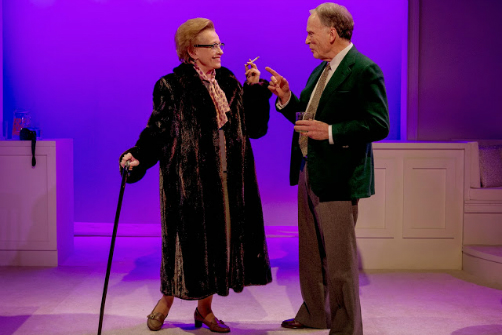Hellman v. McCarthy
By Brian Richard Mori; Directed by Jan Buttram
Off Broadway, New Play
Runs through 4.13.14
Abingdon Theatre Company, 312 West 36th Street
Runs through 4.13.14
Abingdon Theatre Company, 312 West 36th Street
by Eleanor J. Bader on 3.24.14
 Roberta Maxwell and Dick Cavett in Hellman v. McCarthy. Photo by Kim T. Sharp.
Roberta Maxwell and Dick Cavett in Hellman v. McCarthy. Photo by Kim T. Sharp.
BOTTOM LINE: A brilliantly-written, fast-paced, and somewhat fictionalized account of the literary feud between playwright/memoirist Lillian Hellman and critic/novelist Mary McCarthy.
When Brian Richard Mori’s Hellman v. McCarthy begins, the auditorium lights are still on and most of the people in the room are chatting with their friends, dates, or neighbors. Two stagehands are visible, presumably putting the final touches on the set and shouting directions to one another. A minute or two passes before the audience gets it -- they are being readied to watch legendary talk show host Dick Cavett conduct a live, on-camera, interview. And lest they forget, as soon as Cavett walks on, they’re reminded that his nearly 50-year career has included stints on ABC, CBS, PBS, USA and CNBC.
Now 78, Cavett plays himself in Mori’s compelling drama. Indeed, when he steps onstage his command is obvious. There’s witty banter and corny schtick alongside clever jokes and self-deprecating commentary. He then introduces that evening’s guest, writer Mary McCarthy (played with arrogance and smug self-satisfaction by the terrific Marcia Rodd) best known for penning Memories of a Catholic Girlhood (1957) and The Group (1963). Cavett has invited McCarthy onto the program to discuss her latest effort, a book called Cannibals and Missionaries that is scheduled to be released shortly after the show’s October 1979 taping. The Q&A is fairly predictable, at least until Cavett asks McCarthy which contemporary writers she thinks are overrated. Without missing a beat she names three: Pearl S. Buck, John Steinbeck, and Lillian Hellman. Not only does she dub the latter a “windbag,” she announces -- with imperious hostility -- that “every word she writes is a lie, including ‘and’ and ‘the.’”
Hellman (played by the excellent Roberta Maxwell) does not take kindly to McCarthy’s characterization and since money is no object, she hires attorney Lester Marshall (Peter Brouwer) to sue McCarthy, PBS, and Cavett for libel. The rest of Mori’s play is a retelling of what happened as the litigation -- dubbed “the greatest literary feud in modern American history” by the press -- unfolds. It’s often tense, albeit with a sprinkling of humor, and raises important concerns about freedom of expression and the First Amendment.
As the play proceeds we are also made privy to the back story and learn that McCarthy and Hellman had disliked one another for decades, since serendipitously meeting at a 1948 social gathering on the campus of Sarah Lawrence College. McCarthy saw Hellman as an apologist for Stalin, while Hellman saw McCarthy as a mealy-mouthed liberal who stood for nothing. That Hellman’s books and plays sold millions while McCarthy’s did not certainly added to McCarthy’s hatred of her more successful peer.
That said, Hellman was widely known to be an irascible, mean-spirited, and contrary sort who alienated just about everyone. This made McCarthy -- no shrinking violet herself -- the public favorite during the four-plus years it took for the case to wind its way through the courts. Sadly, the lawsuit ended only because Hellman died before it went to trial. McCarthy was disappointed. “I did not want her to die,” she told reporters. “I wanted her to lose in court.”
Hellman v. McCarthy includes one imagined scene in which the two grand dames meet. It’s both tragic and absurd to see the rivals go at one another:
“You never did disavow the Moscow trials,” McCarthy blasts.
“I am a Marxist,” Hellman replies.
“You are a liar,” McCarthy retorts.
Needless to say, rapprochement was not in the cards for this quick-tempered duo.
As for Cavett, near the end of the production he confides that he came to see the case as little more than “two literary lionesses fighting over a zebra carcass.” And so it was. But Mori’s crisp writing and the cast’s pitch-perfect delivery, makes for an exceptionally entertaining and provocative night of theater.
The question at its core remains relevant: should there be limits on free speech or should we protect the right to voice the outrageous and the offensive? In fact, a week after the passing of Fred Phelps who, as head of the Westboro Baptist Church gained national notoriety after picketing the 1998 funeral of Matthew Shepard with a sign proclaiming that “God hates fags,” the debate continues to elicit passionate sentiments and arouse deep seated fears.
No comments:
Post a Comment